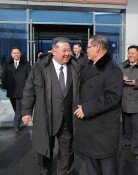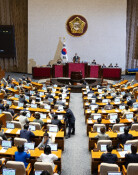Too much haste of N. Korea policy
Too much haste of N. Korea policy
Posted July. 31, 2021 07:46,
Updated July. 31, 2021 07:46
The South Korean government on Thursday proposed to set up a video conferencing system between the two Koreas. It even resumed approval of private sector-led supply of goods to North Korea the next day, which had been completely suspended since the killing of an official of the Ministry of Oceans and Fisheries by North Korea last September. In the meantime, the South Korean Ministry of Unification said that it is desirable that the joint military drills between Seoul and Washington should be put back. Just three days after the two Koreas restored their communication channels, Seoul cleared away the block to assistance to Pyongyang and expressed its intention of postponing joint military exercises with Washington.
The proposal by the Moon Jae-in administration to establish a video conferencing system seemingly intends to lead Pyongyang to take a step forward to be part of dialogue before the R.O.K.-U.S. joint military drills scheduled around mid-August. If Pyongyang responds to this offer favorably, it can turn into a chance to resume dialogue and communication in a long time. However, chances are that North Korea will stall to figure out a calculus. Nevertheless, the South Korean government hastily reopened the door to North Korea to allow for humanitarian assistance even before the North Korean regime replies. All of such hastiness implies that it is thirsty for dialogue.
When an official was shot to death by the North Korean military last year, North Korean leader Kim Jong Un apologized to South Korean President Moon Jae-in and South Korean citizens for giving a feeling of disappointment. However, Pyongyang has not yet responded to Seoul's request for a joint investigation, leaving fact-finding activities unaddressed and the bereaved family of the victim still heart-broken. After the killing of the South Korean citizen occurred last year, Seoul took a measure to ban goods from being sent to Pyongyang. Just 10 months after then, it reversed the decision on the sly even without any explanation heard from the North.
A high-ranking official of the Ministry of Unification said on Friday that Washington may also find it beneficial to take this as an opportunity to make progress in denuclearization and peace-building on the Korean Peninsula. The message may intend to provide momentum for dialogue by delaying joint military drills with Washington as inter-Korean communication channels have come back to normal. Under these circumstances, it may be worth noting that a North Korean news outlet for external relations mentioned President Moon on Friday, saying, "He should stay fully responsible for any development, whether it is good or bad, which will happen in the inter-Korean relations.”
All Pyongyang has done is to restore the communication line that it cut off on its own. There has been no denuclearization effort nor willingness to engage in dialogue. That is why Washington stays careful about resuming talks with Pyongyang although welcoming the news about the restored communication channels. It is a lesson learnt three years ago at the PyeongChang Winter Olympic Games that inter-Korean exchange does mean nothing without any progress in denuclearization talks. If the Moon administration continues to make hasty and impatient decisions while nearing the end of the term, the same mistake will be repeated of arousing Washington's doubt and being shunned by Pyongyang.







